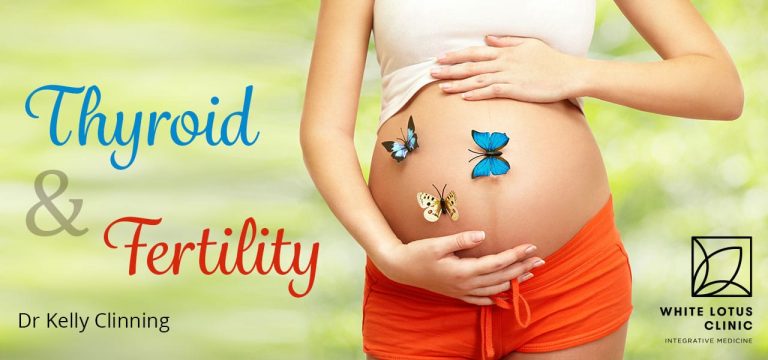
Did you know that almost every single cell within the body has a thyroid hormone receptor? The thyroid hormones drive energy production and metabolism, making them essential to our health and wellbeing. Read on to learn more about thyroid health, and how these hormones impact reproduction.
Hypothyroidism is a condition in which the thyroid gland produces lower amounts of the two thyroid hormones (T4 and T3). It can, therefore, cause a large range of symptoms that all reflect metabolism slowing. Common symptoms include brain fog/focus issues, constipation, low mood, weight gain, dry hair and skin, hair loss, and cold hands and feet.
Furthermore, thyroid health disorders are estimated to be 7x more common in women than in men. They’re also estimated to occur in 1 of every 10 Canadians!
Considering how many women suffer from a thyroid condition, and the essential role the thyroid plays in metabolism, women should be aware of the role the thyroid plays throughout fertility, pregnancy, and postpartum phases.
TSH and Fertility
Previously it was believed that a TSH (thyroid-stimulating hormone) level below 4.0 was fine for fertility. In contrast, more recent research supports a TSH level below 2.5 for optimal fertility outcomes1. If you’re struggling with fertility, make sure to get your thyroid assessed to ensure that your TSH levels are optimal.
Elevated thyroid antibodies (Anti TG and Anti TPO) can indicate an autoimmune thyroid issue. Furthermore, elevated thyroid antibodies have been associated with increased miscarriage rates and “unexplained infertility”. This can happen even when TSH and thyroid hormone levels are within normal limits2,3. If you have experienced recurrent miscarriages, run a full thyroid panel that includes these two antibodies to determine if this is a factor at play.

Thyroid Health in Pregnancy
Thyroid hormones drive energy production and metabolism, making them essential for a baby’s growth and development. Pregnancy is a time of increased energy demand. In fact, it’s estimated that women need up to 40% more thyroid hormone during pregnancy to meet this demand. This is because a growing baby relies on mom’s thyroid hormones for the first 3 months of its life until its own thyroid gland takes over.
If you have a pre-existing thyroid health condition, be sure to get your thyroid levels tested immediately upon finding out you’re pregnant. This is to ensure that you have sufficient circulating thyroid hormones. Most women will need to increase their thyroid medication in pregnancy to meet this increased energy demand. Additionally, get your thyroid checked throughout your pregnancy to make sure your medication dose is sufficient.
The Postpartum Period
Postpartum low mood and/or depression could also be associated with thyroid health. Research shows that thyroid antibody presence in pregnancy is associated with depression during the postpartum period 4,5.
Thyroid dysfunction often occurs during this time. It’s known as postpartum thyroid dysfunction (PPTD) and refers to transient hyperthyroidism, hypothyroidism, or both in the first 12 months postpartum6. Approximately 5-9% of all women experience PPTD6. If you’re suffering from low mood or postpartum depression and fatigue, get your thyroid health levels tested. Assessing both your thyroid hormones and thyroid antibody presence could identify an underlying—and treatable—cause!
Next Steps
Do you have more questions about thyroid health? We have many other articles about thyroid here.
And of course, if you are in Ontario or the greater Toronto area and are ready to get a naturopathic perspective, you can read more about how we treat and assess thyroid concerns at the White Lotus clinic here.
Key Takeaways
- Thyroid hormones drive energy production and metabolism
- Thyroid disorders are estimated to be 7x more common in women than men
- “Idiopathic infertility” and recurrent miscarriages have been associated with elevated TSH levels and the presence of thyroid antibodies
- Pregnancy is a time of increased energy demand and therefore requires increased thyroid hormone production
- Postpartum low mood and depression has been associated with elevated thyroid antibodies
References
1 Orouji Jokar, T., Fourman, L., Lee, H., Mentzinger, K. and Fazeli, P. (2017). Higher TSH Levels Within the Normal Range Are Associated With Unexplained Infertility. The Journal of Clinical Endocrinology & Metabolism, [online] 103(2), pp.632-639. Available at: https://www.ncbi.nlm.nih.gov/pubmed/29272395.
2 Toulis, K., Goulis, D., Venetis, C., Kolibianakis, E., Negro, R., Tarlatzis, B. and Papadimas, I. (2010). Risk of spontaneous miscarriage in euthyroid women with thyroid autoimmunity undergoing IVF: a meta-analysis. European Journal of Endocrinology, [online] 162(4), pp.643-652. Available at: https://www.ncbi.nlm.nih.gov/pubmed/19955261.
3 Deroux, A., Dumestre-Perard, C., Dunand-Faure, C., Bouillet, L. and Hoffmann, P. (2016). Female Infertility and Serum Auto-antibodies: a Systematic Review. Clinical Reviews in Allergy & Immunology, [online] 53(1), pp.78-86. Available at: https://link.springer.com/article/10.1007%2Fs12016-016-8586-z.
4 Kuijpens, J., Vader, H., Drexhage, H., Wiersinga, W., van Son, M. and Pop, V. (2001). Thyroid peroxidase antibodies during gestation are a marker for subsequent depression postpartum. European Journal of Endocrinology, [online] pp.579-584. Available at: https://www.ncbi.nlm.nih.gov/pubmed/11720875.
5 Dama, M., Steiner, M. and Lieshout, R. (2016). Thyroid peroxidase autoantibodies and perinatal depression risk: A systematic review. Journal of Affective Disorders, [online] 198, pp.108-121. Available at: https://www.ncbi.nlm.nih.gov/pubmed/27011366.
6 LEAROYD, D., FUNG, H. and McGREGOR, A. (1992). Postpartum Thyroid Dysfunction. Thyroid, [online] 2(1), pp.73-80. Available at: https://www.ncbi.nlm.nih.gov/pubmed/1525571.




